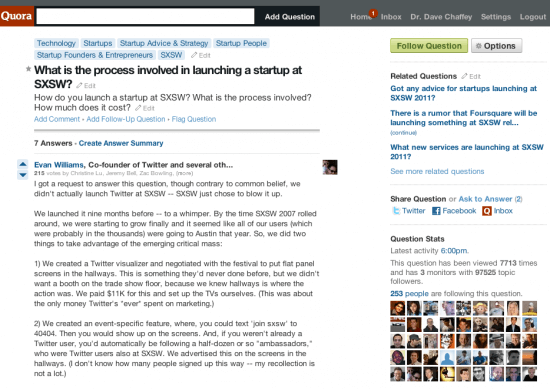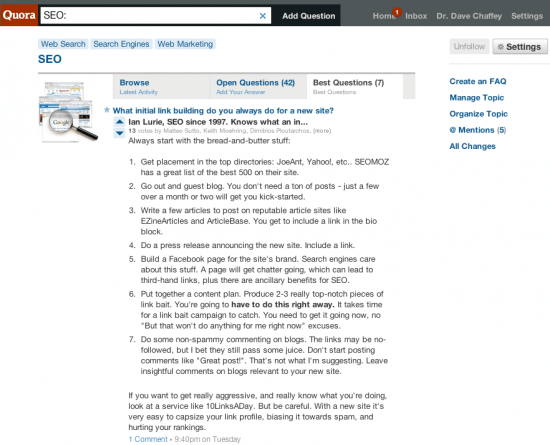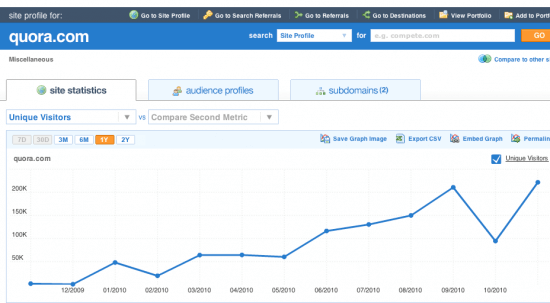A briefing on using Quora for digital marketing
Before I start my mini-rant I have to say I do see the value of online Q&A services. I really enjoy answering questions and reading answers - it's one of the best ways to learn. They can also help in a small way in learning about customer needs and making folks aware of your services.
Buzz about Quora
I decided to write this summary since there's been a massive amount of chatter about Quora in the digital marketing world in the first week of 2011. Like me, you're probably thinking: "what is it", "what makes it different from Yahoo! Answers?" and "how can it help my online marketing?" I think many became aware of it through this widely shared article on the Telegraph and similar stating that "Quora will be bigger than Twitter".
I initially picked up on it through a Tweet giving this giving an example of Quora by Jeremiah Yowyang which gives you a good idea of how it works. He said: Quora is taking off by early adopters, question by Scoble, answers by Foursquare and Twitter founders".

How Quora works and the benefits for users
The example question about launching a startup shows the benefits of Quora, which for me are:
- 1. Get your questions answered by a community (nothing new here)
- 2. Answers voted up by community - a great feature and I like the implementation of this, though again nothing new - similar to Stack Overflow that I've used for years to answer technical questions. Works better than the Linked In or Yahoo! equivalents
- 3. Tags on topics - I like this - useful for seeing what's hot on a topic - see the example below on Quora best questions on SEO.
- 4. Has Best Questions feature as in this example
- 5. Comments on each answer
- 6. Potentially credible respondents for a B2B audience?
- 7. Can follow updates to answers as with most blog comments
- 8. Results available within Google Search results so can look for answers there too.

14 reasons Why Quora won't be bigger than Twitter
So Quora have certainly made a good job of launching the product and creating some buzz around it, but "don't believe the hype" that it will supersede Twitter in the long run since:
1. Asking or answering questions isn't a daily must for most. But you often do want to socialise and share daily which is what you can do on Twitter or Facebook. The proposition for daily use just isn't there for most. Or do longer-time users of Quora disagree?
2. It's not a new service - my colleagues Dan and Stu were telling me they joined the beta last May and it's growth since then has been modest according to Compete.com.

3. The critical mass of users isn't there yet so the answer quality is variable.
4. There are better niche communities where you can get your questions answered, for example specialist communities or Linked In groups.
5. LinkedIn now has Open Groups (probably in response to Quora) where the Q&A are searchable in Google.
6. You can use Google search to go straight to Q&A without the need to register - as with Yahoo! Answers - so many will browse, but not contribute.
7. In my experience the answers tend to be too brief to be useful - see example below on Quora best questions on SEO.
8. There aren't that many quality questions - best to search SEOMoz or Webmasterworld in this case for an answer to a question on SEO.
9. Privacy settings mean that you get an email for every follower by default which means a lot of autofollowing if you login by Twitter or Facebook authentication..
10. Most of us won't want yet another social profile to curate, especially if it's limited to the purpose of Q&A.
11. Profile of respondents limited unlike Linked In so you can't find out more about respondent.
12. People who think they know SEO but don't will pollute it with spam links to their site, but these are nofollowed like most social networks won't have any direct benefits.
13. Yahoo Answers is declining in importance.
14. Google couldn't make Google Answers work.
So, that's what I think, but it's based on limited experience of using the service and I'm happy to "eat my hat if necessary". What do you think?









